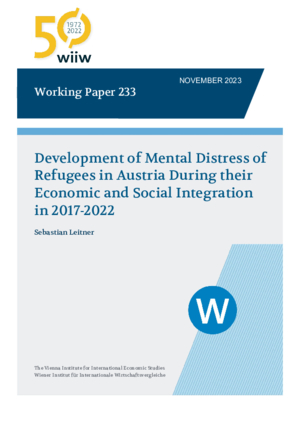Development of Mental Distress of Refugees in Austria During their Economic and Social Integration in 2017-2022
wiiw Working Paper No. 233, November 2023
35 pages including 4 Tables and 1 Figures
Refugees are more likely to develop mental diseases as most of them have been exposed to potentially traumatic events and fundamental stressors in their home countries, during migration and after resettling in the host countries. This diminishes their prospects for social and economic integration, which also may have detrimental effects on their mental health. We examine the prevalence of mental disorders in the refugee population from Afghanistan, Iraq, Iran and Syria who arrived in Austria recently, drawing on data from four waves of the FIMAS refugee survey project. Interviews were conducted between December 2017 and April 2022 in Austria, with a specific focus on Vienna, Salzburg, Graz, Linz and Innsbruck. We found a high share of refugees (31% in 2017/2018, declining to 26% in 2022) who showed moderate or severe levels of mental distress. Women were found to have a significantly higher risk of mental illness. We also investigate the effects of mediators on mental health, applying pooled and panel regression model. A positive association was found, for example, in the cases of discrimination experienced in Austria and obviously potentially traumatic events experienced during migration. Negative correlations were detected for certain mitigating factors that foster resilience, such as proficiency in the German language, living in the same household with one’s partner and children, being employed, having more supportive relationships, and being more satisfied with the housing situation.
Keywords: refugees, mental health, social integration, labour market integration, longitudinal study
JEL classification: I10, J15, F22
Countries covered: Austria
Research Areas: Labour, Migration and Income Distribution
